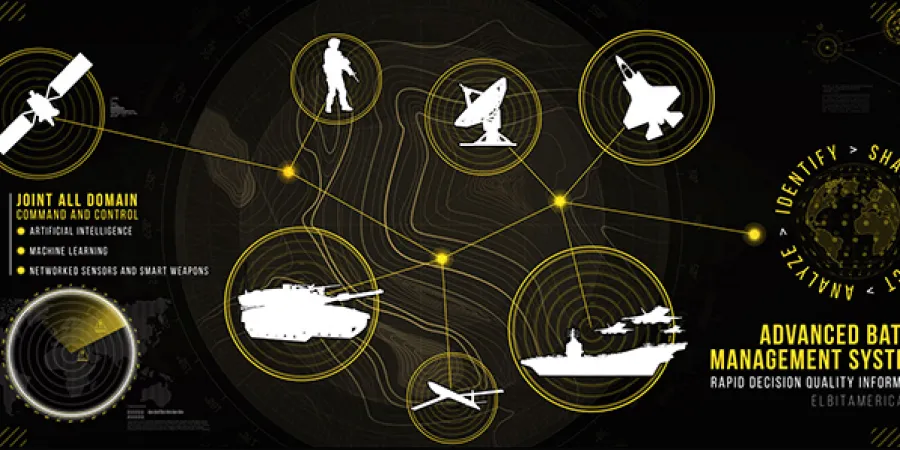Elbit America chosen by USAF to vie for unified command and control system orders
The Joint All-Domain Command and Control concept calls for connecting sensors across all services to a single network so tactical advantages can be attained
IsraelDefense
| 10/11/2020
The United States Air Force has selected Elbit Systems of America, a subsidiary of Israel's Elbit Systems, to compete for future task orders within the service's Joint All-Domain Command and Control (JADC2) Indefinite-Delivery/Indefinite-Quantity (ID/IQ) contract.
The purpose of the JADC2 ID/IQ is to develop and operate systems as a unified force across all domains (air, land, sea, space, cyber, and electromagnetic spectrum) in an open architecture family of systems that enables capabilities via multiple integrated platforms. With this selection, Elbit America can compete for awards associated with the maturation, demonstration, and proliferation of capability across platforms and domains, leveraging open systems design and agile software and algorithm development in order to enable JADC2.
Elbit America is considered a market leader in providing Artificial Intelligence (AI)-enabled, sensor-fused, and networked data to improve situational awareness in the airborne and ground-combat environments. Its C5ISR solutions are part of an extensive portfolio including networked combat and communications systems, mobile command and control capability, autonomous ISR solutions, and AI-enabled decision aids. Combined with its expertise in avionics, helmet mounted and cockpit displays, the company's solutions provide warfighters with the ability to assess and understand their environment, increasing their lethality, survivability, connectivity, and ultimately, mission accomplishment, the company says.
"Elbit Systems of America is honored to help the U.S. Air Force realize the vision for connecting sensors and effects across multiple domains," said Raanan Horowitz, President and CEO of Elbit Systems of America. "Our concept for JADC2 facilitates our Warfighters enjoying an asymmetric advantage by providing tools that shorten reaction time and aid in decision-making. To achieve this, we are developing networked, AI-enabled solutions that fuse sensors and data to increase situational awareness and deliver increased lethality."
The Joint All-Domain Command and Control concept calls for connecting sensors across all services to a single network so tactical advantages can be attained
The United States Air Force has selected Elbit Systems of America, a subsidiary of Israel's Elbit Systems, to compete for future task orders within the service's Joint All-Domain Command and Control (JADC2) Indefinite-Delivery/Indefinite-Quantity (ID/IQ) contract.
The purpose of the JADC2 ID/IQ is to develop and operate systems as a unified force across all domains (air, land, sea, space, cyber, and electromagnetic spectrum) in an open architecture family of systems that enables capabilities via multiple integrated platforms. With this selection, Elbit America can compete for awards associated with the maturation, demonstration, and proliferation of capability across platforms and domains, leveraging open systems design and agile software and algorithm development in order to enable JADC2.
Elbit America is considered a market leader in providing Artificial Intelligence (AI)-enabled, sensor-fused, and networked data to improve situational awareness in the airborne and ground-combat environments. Its C5ISR solutions are part of an extensive portfolio including networked combat and communications systems, mobile command and control capability, autonomous ISR solutions, and AI-enabled decision aids. Combined with its expertise in avionics, helmet mounted and cockpit displays, the company's solutions provide warfighters with the ability to assess and understand their environment, increasing their lethality, survivability, connectivity, and ultimately, mission accomplishment, the company says.
"Elbit Systems of America is honored to help the U.S. Air Force realize the vision for connecting sensors and effects across multiple domains," said Raanan Horowitz, President and CEO of Elbit Systems of America. "Our concept for JADC2 facilitates our Warfighters enjoying an asymmetric advantage by providing tools that shorten reaction time and aid in decision-making. To achieve this, we are developing networked, AI-enabled solutions that fuse sensors and data to increase situational awareness and deliver increased lethality."



